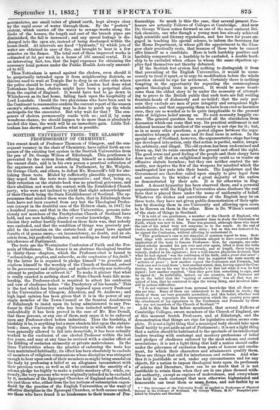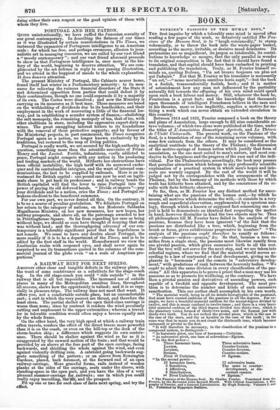SCOTTISH UNIVERSITY TESTS: THE GLASGOW PROFESSORSHIP OF CHEMISTRY.
THE recent death of Professor Thomson of Glasgow, and the con- sequent vacancy in the chair of Chemistry, have called forth an ex- posure of the existing test system in the Scottish Universities from the pen of Dr. George Wilson of Edinburgh. This gentleman is prevented by the system from offering himself as a candidate for the vacant chair, and is in his own person a practical refutation of the argument used last session in Parliament, by Mr. Walpole, Sir George Clerk, and others, to defeat Mr. Moncreiff's bill for abo- lishing these tests. Misled by sufficiently plausible appearances, they urged that the tests were inoperative ; and that, being so, their retention on the statute-book was no practical grievance, and their abolition not worth the contest with the Established Church party, who were not inclined to yield that slight acknowledgment of their Church being the State Establishment of Scotland. The ap- pearances that misled them were the facts, that in Edinburgh these tests have not been exacted from any but the Theological Profes- sors (except in the doubtful case of the Hebrew chair, in 1847) for a hundred years ; and that in the other Universities, persons note- , riously not members of the Presbyterian Church of Scotland have held, and are now holding, chairs of secular knowledge. The con- clusion they rather hastily founded on these facts was, that nobody was excluded, and that the condition of things was precisely par- allel to the retention on the statute-book of penal laws against Jesuits et id genus omne,—an inconsistency, no doubt, and an ob- solete form, but perfectly harmless, and needing no fussy and formal interference of Parliament.
The tests are the Westminster Confession of Faith and the For- mula of Obedience. The former is an abstruse theological treatise in thirty-three chapters, which the Professor-elect is bound to "acknowledge, profess, and subscribe, as the confession of his faith." By the latter he is required to pledge himself " to practise and conform himself to the worship of the Church of Scotland, submit to its government and discipline, and neither directly nor indirectly attempt to prejudice or subvert it." To make it plainer that what is really exacted is nothing short of State-Church boni fide mem- bership, the Professor-elect is required to attest his confession and vow of obedience before " the Presbytery of his bounds." This is the test which has been actually imposed upon every Professor 1 in the Universities of Glasgow, Aberdeen, and St. Andrews ; and high legal opinion has been given that it is in the power of any single member of the Town-Council or the Senatus Academicus of Edinburgh to insist upon its being administered to any Pro- fessor in that University who has been inducted without it; as undoubtedly it has been proved in the case of Mr. Mao Douall, that these persons, or any one of them, may cause it to be enforced upon any Professor-elect before induction. Thus the hardship, if hardship it be, is anything but a mere obsolete blot upon the statute- book ; since, even in the single University in which the rule has been generally allowed to fall into desuetude, it has been actually ' worked to the exclusion of one elected Professor within the last five years, and may at any time be revived with a similar effect at the bidding of sectarian animosity or private malevolence. In the three Universities where the practice of enforcing the tests has been maintained habitually, its effect has been absolutely to exclude all members of religious communions whose discipline was stringent enough to bear upon such of their members as might bring scandal on the body by professing a belief or an allegiance inconsistent with their previous vows, as well as all who estimated the sanctity of a solemn pledge too highly to make a public mockery of it; while, cu- riously, the very persons who were originally intended to be excluded by it, members of the Episcopal Churches of England and Scotland, are just those who, either feoin the lax notions of subscription engen- dered by the practice of the English Universities, or the want of effective discipline in the Episcopal Churches, or both causes united, are those who have found it no hinderanee to their tenure of Pro-
fessorships. - So- much it this the case, that several present Pro- fessors are actually Fellows of Colleges at Cambridge. And-now Dr. George Wilson comes forward as one of the most eminent Bri- tish chemists, one who though a young man has already achieved high scientific and literary reputation, and has been for years en- gaged in teaching his special science, to inform the Secretary for the Home Department, in whose gift the appointment to the Glas- gow chair practically rests, that because of these tests he cannot offer himself as a candidate. Here is both hardship positive and hardship comparative; a hardship to be excluded, a double hard- ship to be excluded when others to whom the same objection ap- plies find themselves not thereby debarred.
If the Scottish test system had nothing to distinguish it from that prevailing at the English Universities, it would be unne- cessary to treat it apart, or to urge its modification before the whole question should be ripe for settlement. Certainly there is nothing tempting in the opportunity for repeating the commonplaces against theological tests in general. It would be more weari- some than the oldest story to be under the necessity of attempt- ing to prove to the British public that such tests are full welling fountain-heads of dishonesty and no-belief; that the only per- sons they exclude are men of pure integrity and scrupulous high- mindedness; and that supposing them to have been ever so harmless once, they are so worded as to be quite inapplicable to the present state of religious belief among us. No such necessity happily ex- ists. The general question has received all the elucidation from discussion which can come that way. Its practical settlement is not deferred because the intellect of the country is not ripe for it ; but, as in so many other questions, a period elapses between the argu- mentative triumph of a cause and its final issue in action. In the special ease of Scotland, however, the argumentative stage has long ago developed into action, only thataction is partial, unfair, irregu- lar, arbitrary, and illegal.. The old system has been undermined and blown up, but its ruins encumber the ground and offend the sight. The good sense and good feeling of the people and their clergy have done nearly all that an enlightened majority could ac to render an offensive statute harmless; but they can neither control the mi- nority, nor deprive the few of the weapons for mischief which the unabrogated law puts into their hands. The Legislature and the Government are therefore called upon simply to give legal form and sanction to the wishes of a. great majority of the nation as demonstrated by their acts. It is far otherwise in Eng- land. A decent hypocrisy has been observed there, and a personal acquaintance with the English Universities alone discloses the real farce that is played there under the name of uniformity of belief Whatever the wishes and convictions of the English may be on these tests, they have not given public demonstration of their opin- ions by disusing them in. one University and allowing open scorn to be thrown on them in the other. Here is Dr. Wilson's account of the state of things in Scotland.
" It is told of one gentleman, a member of the Church of Englund, who was presented to a chair, that he requested time to study the Confession of Faith, which was new to him. Time was granted, although those who knew the east of his mind were not sanguine as to the result. At the end of twelve months he was still requesting delay ; but as this was demurred to, he signed the Confession, without affecting to understand it. " This gentleman's case is not singular, if common report be true. Scot- land rings with accounts of the incidents alleged to have occurred at the application of the testa to famous Professors: how, for example, ono cele- brated scholar mended his pen over and over again, lifted it from the table and threw it down. fingered it nervously, and at length, there being no remedy, dashed in his signature; how a well-known physician declared, that zehwat ahneethliitedr signed '07.aesletelrirerirefessreloitiloaft faireth, tah,gerectteteedeaml merely as articles of peace' ; how another signed the Confession and Formula, but took care not to read them' ; how another stated, that, having signed the Con- fession, he was on his way to a bookseller's to find out what it was he had signed ; how another reported,. that they gave him something to sign, and he signed it.' 0.-•
up to the belief
iritauthieh something' 8 Professor act re- quired of him, that he contrived to sign the wrong thing, and involved Win: that was re- self in serious difficulties.
" I do not venture to assert from personal knowledge that all those on- dits are true. Many of them are understood to be founded in truth ; the whole ofthem are very generally y accredi7ide; andethieebelief, whether well n fthe attachment or not,orfeqesilgritsatuhresintoterge:aconnfew.t.h.thd country puts upon who are not members of the Church of Scotland: '• Add to this the fact before mentioned, that several Fellows of Cambridge Colleges, sworn members of the Church of England, are at this moment Scotch Professors, and at Edinburgh, and the demonstration that things are ripe for legislative action seems com- plete. It is not a light thing that a municipal body should take upon itself tacitly to put aside an act of Parliament ; it is not a light thing that a nation should be habituated to the spectacle of its intellectual leaders treating with contempt and mockery professions of belief and pledges of obedience enforced by the moat solemn and sacred associations ; it is not a light thing that half a nation should suffer under the grievance of exclusion from posts of honour and emolup ment, for which their characters and attainments qualify them. These are things that call for interference and redress. And whe- ther it is justifiable or not, under any circumstances and for any objects, for a nation to impose theological tests upon its professors of science and literature, there can be no doubt that it is not justifiable to retain them when they are in one place disused withp out authority, except as engines of malevolence, and everywhere else held in such contempt that men otherwise highinic pa and honourable can treat them as mere forms, and not forfeit by so • " The Grievance of the University Tests, as applied to Professors of Physical
Science in the Colleges of Scotland. By George Wilson, M.D." Pamphlet pub- lished by Simpkin and Marshall.
doing either their own respect or the good opinion of those with whom they live.



























 Previous page
Previous page